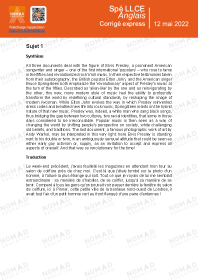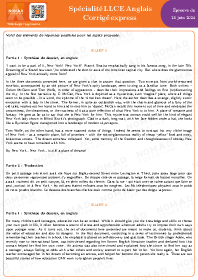Death of a Salesman
📝 Mini-cours GRATUIT
Death of a Salesman: summary
🎲 Quiz GRATUIT
📄 Annales PREMIUM

Sujet d'entraînement corrigé — Spé LLCE Anglais

Annales corrigées de Métropole 2022 – Spé LLCE Anglais

Annales corrigées de Métropole 2023 – Spé LLCE Anglais

Annales corrigées de Métropole 2024 – Spé LLCE Anglais
🍀 Fiches de révision PREMIUM

A brief outline of English literature / Part 1

A few quotations / Part 2

A few quotations / Part 3

A brief outline of North American literature

Étude d'un film : Vocabulaire

A few quotations / Part 1

Étude d'un film : Méthodologie

A brief outline of English literature / Part 2



